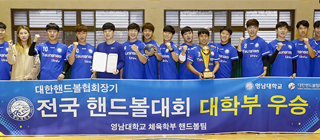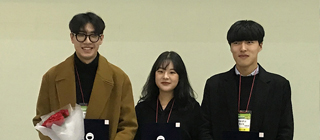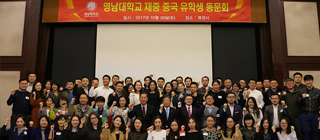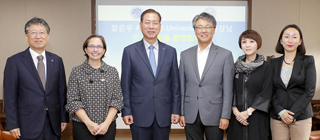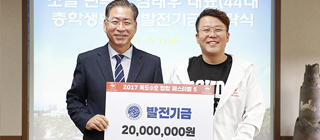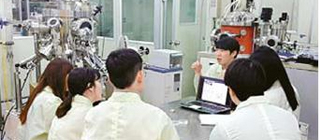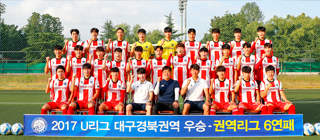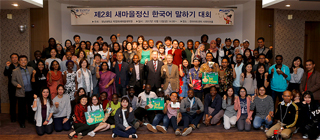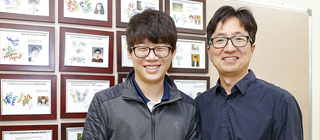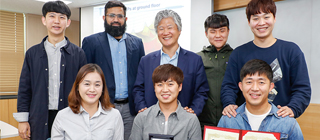-
-
Won the ‘Grand Prize’ of PVC Eco Design Award 2017 An idea of using PVC waste blocks… Easily handled by everyone and highly applicable for facility installation “If any company shows an interest in this idea, patent application is under consideration.” [2017-11-10] A joint team composed of YU and Kyugnil University students won the grand prize of PVC Eco Design Award 2017 with a brilliant idea. The PVC Eco Design Award is a special exhibition to create new value and explore the use of PVC waste by adopting a good-design concept to PVC’s applicability and resource recycling. This exhibition, celebrating its 3rd anniversary this year, was held by the Korea Vinyl Environmental Council and sponsored by the Ministry of Environment and the Korea Environment Corporation. The year’s subject was “Add new future value to daily living.” A total number of 300 teams participated in the exhibition and about 100 qualified idea works from the preliminary tests were selected for the main contest. The grand prize was awarded to the joint team of Mun Junshik (23, Junior, Dept. of forest resources & landscape architecture, Left) from YU, Gwon Haewon (21, Junior, Dept. of biotechnology, Center) from YU and Hwang Suncheol (23, Junior, Dept. of renewable energy, Right) from Kyungil Univ. They proposed the idea of ‘PVC DIY Block Garden’, which is a block-shaped small construction material made with PVC waste. Their work got a high score in the evaluation, in view of ‘easily handled by everyone and highly applicable for daily living’. Mun Junshik mentioned his comment of award, “A variety of shapes can be made with block modules and easily applied for flower garden, vegetable garden, stair and so on.” He added, “Everyone can easily manufacture and install them with favorite colors. They create a pretty look also. Our idea seems to get a higher score in that our idea can be applied also for currently issued villager-oriented concept in urban regeneration project.” Their conceptual idea and actual size manufacture were invited and displayed in ‘Eco-Expo Korea 2017’ from November 1 to 4 at KOEX in Seoul. “Our advisor professor recommended us to apply for patent because the idea is excellent. If there is any company showing an interest and circumstances are permitted, we intend to apply for patent after refining our idea,” according to him.
-
‘Chinese Alumni Meeting in China’ held. Over 70 alumni meet to strengthen ties Active in various parts of society such as college professors, public officials, national institutes, and global companies Chinese alumni network to act as a bridge for YU’s global exchange [October 30, 2017] <The ‘YU Chinese Alumni Meeting in China’ was held in Beijing, China on the 28th.> “See here, the old land of Silla~ Where the spirit of the nation lives and breathes...” YU’s school song was sung under the skies of Beijing, China. In the afternoon of the 28th, despite it being a holiday, over 70 Chinese YU alumni working in different parts of China gathered at the Rose Day Hotel in China. They made time from their busy schedules to attend the ‘YU Chinese Alumni Meeting in China’. This alumni meeting was the second meeting held in China since the general meeting for the founding of the ‘YU Chinese Alumni Meeting in China’ in 2012. They work in different fields such as public officials for the central and provincial government of China, college professors, major national institutes and public corporations of China, and the Chinese branches of Korean conglomerates such as Samsung, Hyundai and LG as they lead the development of China in different parts of Chinese society. Key university figures such as YU President Sur Gil-soo and External Cooperation Office Director Lee Hee-wook also attended this alumni meeting. YU President Sur said, “Graduates from YU are doing great things only in Korea, but also the US, China and other parts of the world. Coming to Beijing, the heart of China, I can really feel just how much power YU alumni has in China.” He added, “Even at this very moment, over 800 Chinese students are studying hard in YU. I trust that they too will become leaders of China in the near future like you. I hope that the YU alumni association will act as the center as global leaders that lead not only China, but the entire world.” At the alumni meeting, Doctor Yin Binfeng was elected as the second alumni chairman to succeed Nankai University Professor Cui Xun, who was the first chairman of the alumni association since 2012. Dr. Yin graduated from the YU Graduate School joint master’s and PhD program in mechanical engineering this year and is currently working at the Chinese National Center for Nanoscience and Technology. Mr. Yin said, “I feel a grave sense of responsibility to act as chairman on behalf of my seniors serving in different parts of China. Together with all my seniors here, I will lead our Chinese alumni association with other juniors who have graduated from YU and are working in China.” He added, “We will not stop at being simply an international student alumni meeting in China, but continue to strengthen our ties with YU by constantly interacting with our alma mater.” <YU visited the Chinese National Center for Nanoscience and Technology and discussed exchange plans.> YU is planning to strengthen its global network through its alumni network in China. Prior to this meeting, YU President Sur Gil-soo visited the Chinese National Center for Nanoscience and Technology on the 27th to discuss global exchange plans for professors, students and research, and the YU alumni in China are acting as a bridgehead for exchange activities in China. Meanwhile, the alumni that attended the meeting collected funds for YU’s development. They collected donations and handed it over to YU President Sur, and promised to meet again with more alumni in the next meeting. The funds that they donated will be used to promote the international student alumni association and as scholarship funds for Chinese students studying in China.
-
Vice-President Chang Eun-woo, Chemistry Class of ‘81, visits YU Signed exchange MOU in December 2016, active exchange student program Agreed to increase exchange programs such as internships, industry/academic cooperation, joint international research, cultural experience groups, etc. [October 31, 2017] <Ashland University Vice-president Chang Eun-woo (left), a YU alumni, visited his alma mater to agree on exchange plans between the two universities.> On October 24, Vice-president of Ashland University Chang Eun-woo (55) visited YU to discuss exchange plans between the two universities. Mr. Chang is an alumnus of YU as the Class of ‘81 in the YU Department of Chemistry and has been serving as the vice president of Ashland University since February 2016. It is very rare for a Korean to serve at such an important high-ranking position in foreign universities. Mr. Chang was welcomed by YU President Sur Gil-soo and they discussed plans to expand exchange activities between the two universities such as expanding the exchange student program, pursuing mutual internship exchange, joint industry-academic cooperation projects, joint international research, and short-term cultural experience teams. Mr. Sur said, “Students going to Ashland University as exchange students will feel a great sense of pride as their senior from YU is serving as the vice-president.” He added, “Interaction will continuously be expanded in various fields such as students, professors and research for the globalization of the two universities.” YU signed an international academic exchange agreement with Ashland University in December 2016, and there are currently three YU students at Ashland University as exchange students. Mr. Chang also met with five YU students who are scheduled to go to Ashland University in the first semester of next year. Ashland University that was founded in 1878 is a private university located in Ohio and has approximately 5,700 students. The university was ranked 131st in the Washington Monthly’s 2016 College Guide and Rankings, and its MBA program is in the top 40 of the United States.
-
Alumni Kim Tae-woo, the 44th student body chairman, donates 20 million won on 26th for scholarships Founded ‘Social Run To U’ and donated 49 million won for school development funds, etc. since 2013 [October 31, 2017] <CEO of Social Run To U (right) Kim Tae-woo, who was the 44th YU Student Body chairman, donated 20 million won to be used for development of the university.> Social Run To U CEO Kim Tae-woo, who is a former student body chairman of YU, made news with his continuous donations. He donated 4 million won to YU in July of this year and again donated 20 million won on October 23. Kim Tae-woo (32), the 44th student body chairman of YU, founded the cultural organization ‘Social Run To U’ to plan and host various cultural performances, and has been donating parts of the revenue from performances as development funds for YU since 2013. Mr. Kim donated a total of 49 million won through six separate occasions over the past five years. Social Run To U hosted the Dokdo Protection Hip Hop Festival during the Chuseok holidays and donated 20 million won from the revenue from the concert to YU. The funds donated by Mr. Kim will be used for student scholarships. Mr. Kim said, “Though it is not much, I want to help my alma mater and my juniors at YU whenever I have the chance.” He stated, “I worked hard in school and I am working hard now in society, and I am always hoping that YU and my juniors will do well.” YU President Sur Gil-soo said, “I am proud to have a fellow alumnus who graduated from school and is continuously donating funds for the university and juniors, while also leading the culture of donating.” He added, “The university will continuously provide support so that other students will also graduate and be able to put in their part in society.” ‘Social Run To U’ is a cultural organization established by college students and young professionals in 2013 to give hope, encouragement, advice, and to spread a new culture of donating to youths. This company planned concerts such as the Dokdo Protection Hip Hop Festival since 2013 and has been donating part of its earnings for college development funds and has been leading the donation culture through various cultural projects.
-
The YU Automobile Lighting Convergence Professional Fostering Project Team fosters key personnel for future automobile technologies Recruiting master’s and PhD students in the Department of Automobile Lighting Convergence Engineering from October 27 Huge support such as scholarships, overseas projects, and industry-academic projects [October 25, 2017] There has recently been an increasing demand for LED-IT convergence technologies for smart lighting for vehicles. It is intended not only for design, but also driver safety. The automobile lighting convergence professional fostering project is being carried out by YU, Korea Polytechnic University, and the Daegu-Gyeongbuk Design Center. It is leading the fostering of professionals in automobile lighting equipped with global capacities through the support of the transportation device specialized lighting key technology development professional fostering project within the industry professional capacity strengthening project supported by the Ministry of Trade, Industry and Energy, Korea Institute for Advancement of Technology, Gyeongsangbuk-do and Gyeongsan-si. YU is the main institute that fosters key technical professionals for LED-IT convergence for automobile lighting, while the Korea Institute for Advancement of Technology and the Daegu-Gyeongbuk Design Center are participating as participating institutes that are in charge of fostering high-power LED light source technology personnel for vehicles, comparing designs, and planning and operation processes. The YU automobile lighting convergence professional fostering project team founded the Department of Automobile Lighting Convergence Engineering with the support of the Ministry of Trade, Industry and Energy and is operating master’s and PhD programs. The Department of Automobile Lighting Convergence Engineering is carrying out joint industry-academic-research projects based on corporate demand to incubate personnel with R&D capacities meeting recent technological trends. The Department of Automobile Lighting Convergence Engineering is conducting ▶practical education based on professional design and analysis tools used in automobile lighting companies, ▶reflecting opinions of companies when making the curriculum, and ▶carrying out joint industry-academic projects proposed by companies for all participating students under the leadership of professors. Students will have the opportunity to gain experience by working on R&D projects that can be applied immediately to companies and to interact with current corporate professionals. <Laser fog lamp co-developed by Hyundai IHL and YU through industry-academic cooperation [Source: Jungang Ilbo]> The automobile lighting convergence professional fostering project team is currently in its third year of the project. A total of six students graduated from the Department of Automobile Lighting Convergence Engineering as of October 2017. There are currently 13 students in major courses (10 master’s, 3 PhDs) and five are enrolled in the master’s degree track course. A total of 10 theses were published in domestic and foreign journals so far. A total of 35 theses were presented in domestic and foreign academic conferences. Ideas deduced through industry-academic projects and the ideas of professors and students were developed to apply for 17 patents, and four patents completed registration. The ‘Single-type optical meter of vehicle lighting devices (patent application number 10-2017-0015763)’ was an achievement made through the joint research with Hyundai IHL. The development of the laser rear fog lamp and improving mass-productivity is assessed to have contributed to improving the durability reliability. The Department of Automobile Lighting Convergence Engineering is developing various creative and convergence-type educational programs in order to foster personnel with professional knowledge and capacities needed on site, while investigating demand among corporate professionals. Educational courses specialized in automobile lighting are also being operated. Practical education provided by corporate experts and on-site learning where students receive education at corporations are also being carried out. The design thinking education course developed by the Daegu-Gyeongbuk Design Center is also contributing in the fostering of engineers that integrate engineering and design minds. Among ideas deduced through creative design education, the internal temperature control device for vehicles using solar powered electricity received the grand prize at the 5th Solar Festival’s ‘Solar Life Idea Contest’. Korea Polytechnic University is supporting overseas education for students as part of its global personnel fostering project in the LED lighting field. Students are continuously participating in international conferences related to automobile lighting to identify technological trends and research directions of the automobile lighting sector, while searching for plans to promote human interchange and research exchange through visits to related universities and research institutes. At the OPIC LEDIA conference, which is an international academic conference held in Yokohama, Japan, seven students made presentations on their research while five students made presentations at Photonics Prague 2017 in the Czech Republic. Up until now a total of 10 students and 16 enrolled students were fostered, while presenting 16 cases of research achievements in their active international academic activities. Recently, Professor Lee Chan-soo and student, Sohn Min-seok, presented their research thesis at the ISAL conference held in Darmstadt, Germany. An MOU was signed with Darmstadt University and they agreed to pursue joint international research. 18 companies such as Hyundai IHL, SL and AMS participated in the joint industry-academic projects related to automobile lamps. A total of 15 projects were carried out and currently nine are being worked on. An automobile lighting industry-academic-research expert forum and expert counsel were established to construct a technical cooperation network among companies, researchers and universities related to automobile lighting. The automobile lighting technical trends and convergence technology workshop was held as a special session of the Korean Society of Automobile Engineers. This year, the launching ceremony and workshop for the automobile lighting and transportation device convergence lighting research association will be held during the lighting electricity equipment society at the Korean Science Technology Association Hall on the next of next month.
-
‘Zero losses’ in 2017 U League region as sixth straight regional champion Never lost in 65 matches since 2013 in the region Represent Gyeongbuk in the National Sports Festival from October to begin U League Championship, high expectations for victory [October 20, 2017] <By winning the ‘2017 U League’ 10 Region Preliminaries, the YU soccer team won the 10 region preliminaries for the sixth straight year> The YU soccer team (Head Coach Kim Hyun-joon) won the 10 regional preliminaries in the ‘2017 U League’ as they write their legend of winning the 10 region preliminaries for the sixth straight year. YU made a remarkable achievement of winning six straight years, and also achieving the fourth victory without any defeats to once again prove that they are unparalleled in college soccer. Even when looking at the entire U League regions, the YU soccer team’s record is outstanding. After the match with the University of Ulsan on May 6, 2010, the YU soccer team has been undefeated at home for 58 straight matches in the U League regional preliminaries. When including away games, it has not lost in the past 65 matches since the away game with Dong-A University on April 5, 2013. Last year, the YU soccer team won four major tournaments to take the throne of college soccer. YU represented Gyeongbuk to win the gold medal at the 2016 National Sports Festival, while winning the 47th Nation Spring College Soccer Championship, 13th Spring Freshmen and Sophomore College Tournament, and winning all 12 matches in the 2016 U League regional matches. This year, the YU soccer team had many changes. Coach Kim Byeong-soo who led the glory years of YU soccer for the past several years went to Seoul E-Land FC of the K League Challenge (Division 2) earlier this year, and Kim Hyun-joon stepped up as the head coach for YU. Furthermore, five players of the team went pro all at once causing a vacuum in players. Despite such changes, the YU soccer team has been demonstrating that they are still as strong as they used to be. The reason why the YU soccer team is so stable is because of the harmony of the old and new. Seo Min-woo (19, Sports Science, freshman) who graduated from the Seoul Jungdong High School this year and enrolled at YU has been showing his true colors after shifting his position to an attacker and recorded 11 goals in 12 U League matches. The older athletes are also doing great. Kim Gyeong-hoon (22, Sports Science, senior) who changed his position to attacker this season has been receiving the complete trust of Coach Kim Hyun-joon thanks to his abilities to dash instantaneously and finish strong. Lee Byeong-wook (21) and Kim Dong-hyeon (21) who are both juniors have been tightening the defensive line as the central defense duo using their strong physical abilities and command for balls in the air. The YU will participate in the 2017 National Sports Festival as representatives of Gyeongsangbuk-do and will participate in the 2017 U League Championships starting off with the match against Cyber Hankuk University of Foreign Studies that will be held at the Yeonggwang Sportium Complex on the 10th. Coach Kim Hyun-joon said, “There were many changes earlier this year, which could have shaken up our team a lot, but our entire team united into one to defend our pride as a college powerhouse.” He added, “Please show your interest and support on how many more trophies the YU soccer team will add this season.”
-
Joined by international students of the Park Chung Hee School of Policy and Saemaul Speech on the theme of ‘Experience on Korean Culture and Life from the Perspective of Foreigners’ Offer opportunity for international students to understand Korean culture and language [October 13, 2017] <The Korean Speech Contest was held on the 13th by international students at the YU Park Chung Hee School of Policy and Saemaul.> YU (President Sur Gil-soo) held a Korean speech contest for international students. This contest began at 2 p.m. on the 13th at the YU Cheonma Art Center Sapphire Hall and was joined by 12 international students enrolled at the YU Park Chung Hee School of Policy and Saemaul. The 12 students from six countries including Malaysia, Zambia and Indonesia made 10 minute speeches on the theme of ‘Experience on Korean Culture and Life from the Perspective of Foreigners’. First place went to Widyatama Bastian, 24 (Major for Public Policy and Leadership, 4th term in master’s degree program, bottom-right). Second place went to Pham Thi Nhung (22, Saemaul and International Development, 3rd term in master’s degree program, Vietnam) and third place went to Kusmiarti Endah (32, Public Policy and Leadership, 4th term in master’s degree program, Indonesia). Mr. Widyatama who won first place stated, “Even though I have a very busy scheduled studying for my major, I have been attending all Korean language classes offered by the school. I hang out with my Korean friends and also make time to study Korean, which is what I think made it possible for me to receive this award.” He added, “I met with other YU international students and Korean students on the Korean holidays of Chuseok and Hangeul Day in October and it helped me to understand Korean culture a little more. I would like to have more various experiences of Korean culture during my time studying here.” Most of the international students at the YU Park Chung Hee School of Policy and Saemaul are, unlike other undergraduate international students, public officials who plan and implement policies at their home countries, employees of public institutes, social activists or other professionals. In a relatively short period of less than two years, they study to earn their master’s degree and the Korean language. In order to offer a wide range of experiences on Korean culture, YU has been hoolding the Korean Speech Contest for the second year this year. <International students speaking at the YU Park Chung Hee School of Policy and Saemaul’s Korean Speech Contest> Park Chung Hee School of Policy and Saemaul Dean Kim Gi-soo who planned this contest said, “Though their Korean may not be very good, they can have the opportunity to get a closer feel for Korean culture by writing in Hangeul and speaking in Korea based on what they studied and their experiences.” He added, “I hope that their knowledge in their major and Korean language skills learned at YU will help them when they return to their home countries.”
-
School of Chemistry and Biochemistry Professor Park Hyun-ho’s research team investigates new platelet coagulation mechanism Listed in latest issue of the global academic journals ‘PNAS’ of the US National Academy of Sciences Research outcomes receive international attention since June... Recognized for world-class research [October 19, 2017] <YU School of Chemistry and Biochemistry Professor Park Hyun-ho’s research team became the first in the world to investigate the new mechanism for platelet coagulation within the blood at a molecular level> (Left to right: Kim Chang-min, Professor Park Hyun-ho) YU School of Chemistry and Biochemistry Professor Park Hyun-ho’s (42) research team became the first in the world to investigate the new mechanism for platelet coagulation within the blood at a molecular level. This research is receiving attention from academic circles as it is anticipated that it will provide a lead for the development of treatment, as well as understanding on thrombosis, which is a major cause for cardiovascular diseases such as myocardial infarction and cerebral infarction. When platelets in the blood coagulate at an abnormal status such as aging or wounds in blood vessels, it can cause blood clots. Localized accumulation of such blood clots can cause various types of thrombosis such as myocardial infarction, cerebral infarction, pulmonary emboliform, and deep vein thrombosis, as well as old-age related diseases. Therefore, anti-platelet agents are used to stop coagulation of platelets for the treatment and prevention of thrombosis. The best known anti-platelet agents are aspirin and clopidogrel. However, existing drugs have severe side effects such as bleeding, so the need for next-generation anti-platelet agents have been needed for quite a while. According to recent research results, GPlb (Glycoprotein lb), which is a platelet acceptor, activates for platelet coagulation only in non-ideal states of the blood vessel, and it also claimed that TRAF4 proteins that combine with GPlb is an important medium for delivering signals within the cell. Accordingly, preventing the combination of GPlb and TRAF4 can reduce side effects such as bleeding, and that it can be the ideal strategy for stopping platelet coagulation. The research team said, “We became the first to reveal the complex structure of TRAF4 and the platelet acceptor GPlb. A specific amino acid order of GPlb is joined with TRAF, and information on their combination at a molecular level will provide essential information for the development of next-generation anti-platelet drugs that stop the combination of TRAF4 and GPlb.” In addition, he said, “This study also revealed where TRAF4 bonds directly with the TGF-b acceptor, which is an acceptor that causes cancer, and it is therefore expected that it will provide important information in development targeted anti-cancer drugs that stops bonding of TRAF4 and TGF-b acceptor.” This study was carried out as the Korea Health Industry Development Institute’s ‘translational research support project’ and the National Research Foundation’s ‘platform technology development project’. Kim Chang-min (28, PhD course at the YU Graduate School of Chemistry and Biochemistry) as the first author and Advising Professor Park as the correspondence author. The research results was published in latest issue of the world-acclaimed academic journals <PNAS> (Proceedings of the National Academy of Sciences of the United States of America, impact factor 9IF) 9.65) published by the US National Academy of Sciences (NAS). In particular, the ‘Vessel Aging Control Research Center’ that is based on the TRAF4 target thrombosis treatment development research proposed by Professor Park’s research team based on the research outcomes was selected as a platform technology project supported by the National Research Foundation recently. Full-fledged research will begin for the development of next-generation anti-thrombosis drugs, and the Seoul National University College of Medicine and the Daegu Gyeongbuk Medical Innovation Foundation’s New Drug Development Support Center will participate as joint research institutes. Professor Park who led this research stated, “Our lab has been focusing on research on drugs and development of treatments through research on cell suicide and immunity and inflammation reactions from long ago. During our research on the structure and functions of TRAF family that is known to be a protein that acts as a medium for cell suicide and inflammation reactions, we found that only TRAF4 was involved more in platelet coagulation rather than typical functions.” He added, “We were able to achieve such great research outcomes by not hesitating and working together for along time in this new field together with the students at the lab.” Meanwhile, Professor Park’s research team has been receiving attention recently for their research outcomes such as publishing the research results on investigating the ‘DNA cutting phenomenon in cell suicide’ at a molecular level in June in <PNAS>. Professor Park and Mr. Kim Chang-min, who are the main authors of this study, were introduced in ‘Korea’s Stars’ provided by ‘BRIC’, which is a biology research information center, and has thus been recognized for their research capacities both domestically and internationally.
-
Department of Information and Communication Engineering Professor Park Yong-wan’s research team wins two awards at ‘IPIN 2017’ and ‘Best Poster Paper Award’ Received attention for demonstration of ‘new conceptual flank technology of smartphone-based indoor location system’ High utilization expected for general public and industries if performance is improved and becomes more compact [October 18, 2017] <Department of Information and Communication Engineering Professor Park Yong-wan’s research team prseented platform technologies that can commercialize indoor navigation at the ‘IPIN 2017’ held at Hokkaido University in Japan and is receiving attention from academic circles.> (From bottom left, Professor Heo Su-jeong, Sohn Hee-dong, Jung Seung-gu, from top left, Lee Chan-seok, Muhammad Usman Ali, Professor Park Yong-wan, Cho Young-rae, Kang Min-gyu) A research team of YU presented platform technologies that can commercialize indoor navigation, and is thus receiving attention from academic circles. At the ‘8th IPIN (Indoor Positioning and Indoor Navigation, hereinafter ’IPIN 2017’ held at Hokkaido University in Japan from September 16 to 2, the research team from YU received the ‘Best Poster Paper Award’ and was the ‘runner-up’ in the competition. The winner of the award was Department of Information and Communication Engineering Professor Park Yong-wan (57), ICT-based Smart Device Creative Talent Fostering Project Team Research Professor Heo Su-jeong (40), and Graduate School of Information and Communication Engineering students Muhammad Usman Ali (38, received PhD), Sohn Hee-dong (26, first time in master’s program), Kang Min-gyu (26, first time in master’s program), and undergraduate seniors Jung Seung-gu (25), Cho Young-rae (25) and Lee Chan-seok (25). ‘IPIN’ is the world’s only international conference joined by over 370 indoor positioning and navigation experts from approximately 40 countries around the world. Academic conferences and contests are held every year with the sponsorship of IEEE Computer Society that posses the highest number of organizations and members among the academic societies of the US IEEE. A total of 219 theses were submitted in the communication and computer sectors at the IPIN 2017 conference, and 165 papers were selected and presented. Professor Park Yong-wan’s research team received the honor of the ‘best poster paper award’ for 2017. In the IPIN 2017 competition, a total of 28 teams joined in a total of four tracks, and the YU research team was runner-up in track 1. The topic of Professor Park’s team was ‘Indoor Positioning Flak System using RSSI (Received Signal Strength Indication) Based Route Loss Model Map’. The research team proposed a path generation algorithm for pedestrians to easily find their way by accurately and quickly providing the current location as there has been a rapid increase in demand for indoor positioning services due to the development of smart devices. At the contest, a mission was given to walk along a 1km path for approximately 10 minutes going up and down the first and second floors of a building at Hokkaido University, and judges evaluated the accuracy of locations. The research team stated, “We developed a real-time indoor navigation system using the overlapping method of the RSSI mpa of the database and the RSSI value obtained by the smartphone.” The team added, “We received a great deal of attention as we have come to the stage right before systemization and commercialization by applying in various applications such as smartphones based on indoor flank research.” Recently, buildings are becoming massive as seen in many skyscrapers and shopping complexes, and underground spaces are also expanding due to the development of subways. Indoor navigation is judged to be a core technology of the future as it will be highly useful, and therefore, Professor Park’s research team’s research findings are receiving a great deal of attention. The research team joyfully said, “We were able to receive this award by paying attention to the vision of indoor positioning flanks and the roles of information and communication technologies and proceeded with research diligently since 2007.” They added, “The technology that we proposed is not applied only for indoor positioning. If technologies can be integrated to improve performance and gain more portability, its application can be expanded to technologies that help with new marketing strategies such as for shopping malls and exhibitions.”
